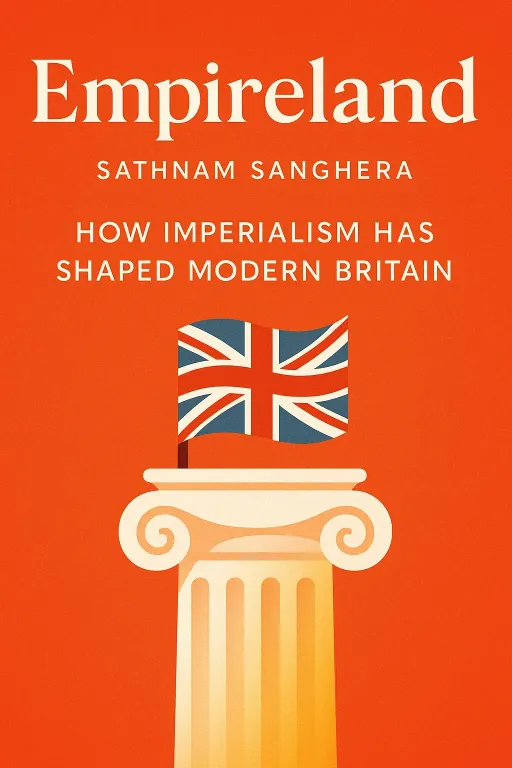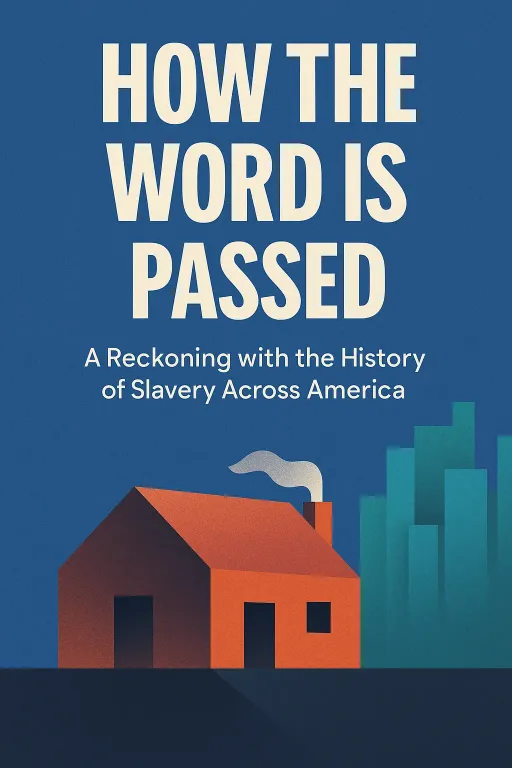
Empireland
11 minHow Imperialism Has Shaped Modern Britain
Introduction
Narrator: Imagine a grand country house nestled in the rolling hills of the English Cotswolds, a region famous for its honey-colored stone cottages and quintessential British charm. But this house, Sezincote, looks like it was plucked from Rajasthan, with a copper onion dome, peacock-tail windows, and a garden temple dedicated to a Hindu sun god. This striking paradox—a Moghul palace in the heart of England—is not just an architectural curiosity. It’s a physical embodiment of a hidden history, a story of immense wealth, cultural exchange, and exploitation. How did this come to be, and what does it tell us about the country around it?
In his book Empireland, author Sathnam Sanghera argues that this is not an isolated anomaly. Instead, it is a clue to a much larger truth: that the British Empire is not a relic of the past but a living, breathing force that has profoundly shaped modern Britain. The empire’s legacy, he reveals, is not confined to museums but is etched into the nation's politics, its economy, its cities, and even its psyche, often in ways that are deliberately forgotten.
The Empire Is in the Everyday
Key Insight 1
Narrator: Sanghera’s central argument is that the British Empire cannot be understood as a distant historical event. Its influence is woven into the very fabric of daily life. He proposes a thought experiment: an "Empire Awareness Day" that would reveal these hidden connections. For example, a physical education class might explore how sports like cricket and football were spread across the globe by imperial administrators and soldiers. An economics lesson could trace the origins of iconic British companies like the Bass Brewery, which became the world's largest in 1877 partly by perfecting and marketing India Pale Ale, a beer designed to survive the long sea voyage to the jewel in the imperial crown.
Even the food on the table tells a story. The book recounts the tale of the "Empire Pudding," a 1920s marketing creation where every ingredient for a Christmas pudding was sourced from a different corner of the empire—sultanas from Australia, cinnamon from Ceylon, cloves from Zanzibar. This was a deliberate act of propaganda, designed to encourage people to "Think and Eat Imperially." Sanghera shows that from the institutions that govern the country to the tea in its cups, Britain is saturated with the legacy of an empire it rarely acknowledges.
"We Are Here Because You Were There"
Key Insight 2
Narrator: A common and misleading narrative in Britain frames multiculturalism as a recent phenomenon. Sanghera dismantles this idea, asserting that the country's diversity is a direct and logical consequence of its imperial history. The presence of black and brown people in Britain is not an accident but the result of centuries of conquest, trade, and migration. As the writer Ambalavaner Sivanandan famously put it, "We are here because you were there."
To illustrate this long history, Sanghera tells the remarkable story of Sake Dean Mahomed. Born in India in 1759, Mahomed served in the East India Company’s army before moving to Ireland and then England. In 1809, he opened the Hindostanee Coffee House in London, Britain’s very first curry house. When that business failed, he moved to Brighton and reinvented himself as a "shampooing surgeon," popularizing therapeutic massage and even earning a Royal Warrant from two kings. Mahomed’s life, over two centuries ago, is a powerful testament to the deep, long-standing connections forged by empire, challenging any notion that Britain’s multicultural story began with the arrival of the SS Empire Windrush in 1948.
The Psychological Scars of Empire
Key Insight 3
Narrator: The book argues that imperialism inflicted deep psychological damage on both the colonized and the colonizers, leaving a set of peculiar traits embedded in the British national character. One of the most curious is a celebration of "heroic failure." Sanghera points to the 1879 Battle of Isandlwana, where a British force was annihilated by Zulu warriors due to catastrophic strategic blunders. Instead of being remembered as a humiliating defeat, the event was spun into a tale of stoic bravery, focusing on the last men fighting to the death. This tendency, Sanghera suggests, reflects a psyche shaped by the anxieties of maintaining a vast and often brutal empire.
This imperial mindset also fostered a deep-seated sense of "exceptionalism"—the belief that Britain is inherently different and superior. This idea, born from governing a quarter of the world's population, continues to influence modern politics. Sanghera connects this imperial nostalgia directly to the Brexit campaign and its vision of a "Global Britain" freed from the shackles of Europe, a vision that echoes the nation's 19th-century self-image.
The Economic Engine of Exploitation
Key Insight 4
Narrator: Empireland confronts the uncomfortable truth about Britain's wealth. The Industrial Revolution and the nation's economic might were not just products of British ingenuity; they were financed by the systematic exploitation of its colonies. The book details the "drain" of wealth from India, citing research by economist Utsa Patnaik, who calculated that Britain siphoned off an astonishing $45 trillion (in today's money) between 1765 and 1938. This wealth, extracted through unfair trade, taxes, and outright looting, flowed back to Britain, funding everything from stately homes to the nation's infrastructure.
This process of extraction was often brutal. Sanghera recounts the 1868 British invasion of Abyssinia (modern Ethiopia). After Emperor Tewodros II committed suicide, British soldiers looted his fortress at Magdala. So much treasure was taken—including priceless manuscripts, crowns, and religious artifacts—that it required fifteen elephants and hundreds of mules to carry it away. The loot was then auctioned off, with institutions like the British Museum and the V&A becoming major beneficiaries. This story is a stark example of how military conquest was explicitly linked to the acquisition of "emotional loot" and material wealth.
The Birthplace of Modern British Racism
Key Insight 5
Narrator: Sanghera makes the provocative and powerful case that modern British racism is a direct legacy of the empire. To justify the subjugation of millions, a racial hierarchy had to be created and enforced. The empire, he argues, evolved into an exercise in white supremacy, where racist ideologies were developed to rationalize economic exploitation and violence.
The book provides harrowing examples of this imperial racism in action. In 1919 Amritsar, following an attack on a British missionary, General Reginald Dyer ordered that any Indian passing down a particular street must crawl on all fours. This "crawling order" was a deliberate act of racial humiliation. Even more extreme was the fate of the Aboriginal Tasmanians. Following British colonization, they were hunted for sport, their lands were stolen, and they were eventually driven to near-extinction in what amounted to an act of genocide. By tracing these events, Sanghera argues that the dehumanizing attitudes required to perpetrate such atrocities did not simply vanish when the empire ended; they were repatriated and continue to fuel racial prejudice in Britain today.
A Nation in Denial
Key Insight 6
Narrator: Why are these stories not more widely known? Sanghera’s final key insight is that Britain suffers from a profound and "selective amnesia" about its imperial past. This collective forgetting is an active process, sustained by an education system that often ignores the topic, a media that perpetuates myths, and a political culture that attacks any critical examination of the past as "anti-British."
A prime example of this is the myth of the Indian railways. They are often presented as a benevolent gift from Britain to India. However, Sanghera reveals they were built primarily to serve British interests: to transport raw materials to ports and move troops to quell rebellions. The projects were financed in a way that guaranteed huge profits for British investors at India's expense, and the construction relied on exploited Indian labor. This gap between the comforting myth and the harsh reality epitomizes the national denial that Empireland seeks to challenge.
Conclusion
Narrator: The single most important takeaway from Empireland is that the British Empire is not a settled matter of history but an unresolved and deeply influential part of the present. Sathnam Sanghera argues compellingly that Britain cannot understand its contemporary political divisions, its racial tensions, its economic standing, or its national identity without first confronting the full, unvarnished truth of its imperial past.
The book leaves the reader with a powerful challenge. Facing up to this history is not about wallowing in guilt or shame. It is about achieving a more mature and honest national self-awareness. The ultimate question Sanghera poses is a profound one: can a nation truly navigate its future if it remains in a state of willful denial about what made it who it is today?









